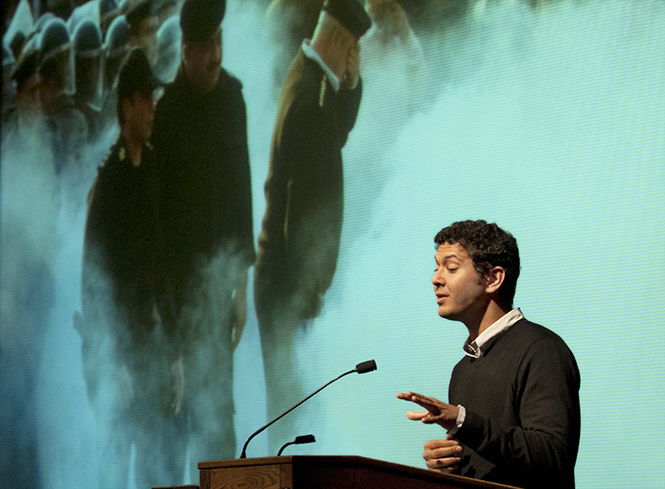Independent journalist Sharif Abdel Kouddous gives insightful speech on journalism and Egyptian uprisings
Sharif Abdel Kouddous, independent journalist and Democracy Now! correspondent, speaks to Kent State students about the political uprising in Egypt in the KIVA on Thursday, Nov. 7, 2013. Kouddous described the uprising as a revolution. “What’s revolutionary is winning the streets,” he said. Photo by Brianna Neal.
Students, faculty and community members had to opportunity to hear firsthand about reporting during the Middle East uprisings as Sharif Abdel Kouddous, independent journalist based out of Cairo, spoke at Kent State on Thursday as part of the Northeast Ohio Consortium for Middle East Studies (NOCMES) speaker series.
The lecture, co-hosted by Kent State’s College of Arts and Sciences, entitled “Reporting Egypt’s Uprisings,” brought attention from a courageous journalist who has lived through the uprisings.
The event was welcomed by Andrew Barnes, Ph.D., an associate professor of political science at Kent State. “We are privileged tonight to be here with most active, connected and thoughtful journalist working in the Middle East,” Barnes said. “In his work, Sharif deals deeply into situations to establish a narrative, he pieces together info and evidence to support an accurate story and disseminates that to the broader public so we can all learn something.”
Kouddous spoke to his audience for 30 minutes before he held a questionnaire.
He discussed what it’s like to be a journalist actively reporting in Egypt’s uprisings. Being from Cairo, Kouddous has a deeply personal level to the situation. After the uprisings started in January of 2011, Kouddous said Egypt has become “darker with deeper struggle.”
“It was like being in a war zone and it’s been increasing difficult to operate as a journalist in Egypt,” Kouddous said.
Attacks on journalists have sufficiently increased since July 3 when Mohammad Morsi was overthrown by the military. At least five journalists have been killed.
For the past three months, Egypt has been in a state of emergency and has a curfew. There is a struggle for change for the Egyptian people. Two sides leading to the current political conflict are the Egyptian military and the Muslim Brotherhood. “There’s a false binary that Egyptians must choose between the two. They are now defined by hierocracy, patriarchy, secrecy, mendacity,” Kouddous said. They have both struggled for power for the past two years, and society has suffered as a result.
On June 30, Kouddous experienced his biggest demonstration when tens of thousands of citizens demanded the resignation of Morsi. “It was a revolutionary moment,” Kouddous said. “It started from the ground up. It was not simply marching on the streets.”
Kouddous has been through several dangerous moment while reporting in the Middle East. When answering a question from an audience member, he explained how reporting in Syria was to reporting in Egypt.
“I was smuggling out by rebel groups,” Kouddos said. “In Egypt, I had a sense of where to be and where not to be.”
Kouddous’ lecture also paved the way for people to go out and learn about what is happening in other parts of the world.
“Give voice to the voiceless,” Kouddous said.
The NOCMES speaker series is currently led by Joshua Stacher, Ph.D., an assistant professor of political science at Kent State and author of “Adaptable Autocrats: Regime Power in Egypt and Syria.”
“An event like this can help raise profile of the political science department,” Stacher said. “It can highlight students to take political science classes and learn more about the world around them.”
Stacher thanked Kouddous at the end of his lecture and talked about the experience blend he had with Kouddous during a Kent State May 4th Memorial tour.
Stacher slightly compared the emotional attachment we have to the May 4th Memorial and all of the various places that had dreadful meaning to them over in the Middle East.
“Just think about how sacred we treat that event,” Stacher said.
Contact Megan Brown at [email protected].



